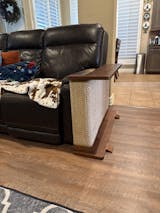If you share your home with a cat, you’ve likely faced the same problem: your beautiful couch has become their favorite scratching spot. Most cat owners believe this is their pet’s way of acting out or destroying furniture on purpose. But in reality, scratching the couch is a completely natural and healthy cat behavior.
Understanding why your cat does it is the first step to redirecting that habit, without stress for either of you.
Why Cats Scratch Furniture Like Couches
Forget mischief! Your cat scratching the couch is all about instinct. Here’s the real four reasons behind those digs, explained.
1- It’s How Cats Maintain Healthy Claws
Scratching helps cats shed the old, dull outer part of their claws, showing the fresh, sharp nail below. This is their natural way to keep claws healthy, ready for climbing, stretching, and play.
If you check your cat’s favorite scratching spot, you might even find small, curved nail sheaths left behind, a sign of normal claw care.
2- It’s a Way to Mark Territory
Those scratches on your couch aren't random. They're actually a form of communication. Cats have scent glands in their paws, so every time they scratch, they leave behind a unique scent.
To your cat, that couch isn't your furniture; it's their majestic kingdom, and you're just visiting.
3- Scratching Helps Cats Stretch and Stay Fit
Cats love a good full-body stretch after resting. When they scratch your couch, they extend their legs, back, and shoulders, the same way you might stretch after sitting for hours. This movement keeps their muscles strong and flexible.
4- Scratching Helps Relieve Stress
Cats also scratch to express their feelings, going beyond just claw maintenance. You might notice them scratching more when they're happy, excited, or even feeling a bit anxious. It's a key way they release extra energy and manage their emotions.
If your cat scratches when you get home, after meals, or after interacting with another pet, it’s likely a positive stress reliever, not bad behavior.
Why Punishing Doesn’t Work
Trying to train your cat not to scratch usually backfires because this essential scratching behavior is necessary for your cat's health. Punishing them with scolding or water sprays, however, simply teaches them to avoid you while they scratch. They'll still fulfill their natural urge, just covertly.
Instead of punishment, focus on redirection and providing better scratching alternatives.
How to Stop Your Cat from Scratching the Couch
Here’s how to help your cat scratch responsibly and save your sofa in the process.
1- Offer the Right Cat Scratcher:
Not all cat scratchers are the same. To win your cat over, look for scratchers with these qualities:
-
Texture: Cats love rough, natural-feeling surfaces like natural sisal.
-
Height: A tall cat scratcher lets your cat stretch fully from paws to tail.
-
Stability: Wobbly posts can scare cats away.
-
Placement: Put scratchers where your cat already likes to scratch, near the couch or by their favorite lounging spots.
2- Try Horizontal Sisal Cat Scratching Mat:
If your cat scratches carpets or the top of your sofa, they may prefer a horizontal surface. Our natural sisal cat scratching mats are affordable and work perfectly for ground-level scratching.
You can even sprinkle a little catnip to make them extra appealing.
3- Protect Your Couch:
Protecting your couch doesn’t have to mean hiding it under covers. Clear protectors like Cat-e-Corner’s couch guards blend into your décor while protecting the spots cats love most, arms, corners, and sides.
This gives your cat time to adjust to using their new scratching area while keeping your furniture safe.
Discover the Cat-e-Corner by Hilde & Phil
4- Give Positive Reinforcement
The single most effective strategy? Reward your cat every time they use their scratching post. Simple things like praise, a healthy treat, or even a short burst of playtime are incredibly powerful. Cats instinctively return to behaviors that bring them good feelings, so make sure to celebrate their correct scratching habits.
What Not to Do? Avoid Declawing
Declawing might seem like a permanent fix, but it’s one of the worst things you can do for your cat. The procedure removes part of the toe bone, not just the claw.
According to research published in the Journal of Feline Medicine and Surgery, declawed cats often face chronic pain and behavioral challenges, including biting or litter box aversion, demonstrating that maintaining intact claws is essential for their comprehensive physical and emotional health.








